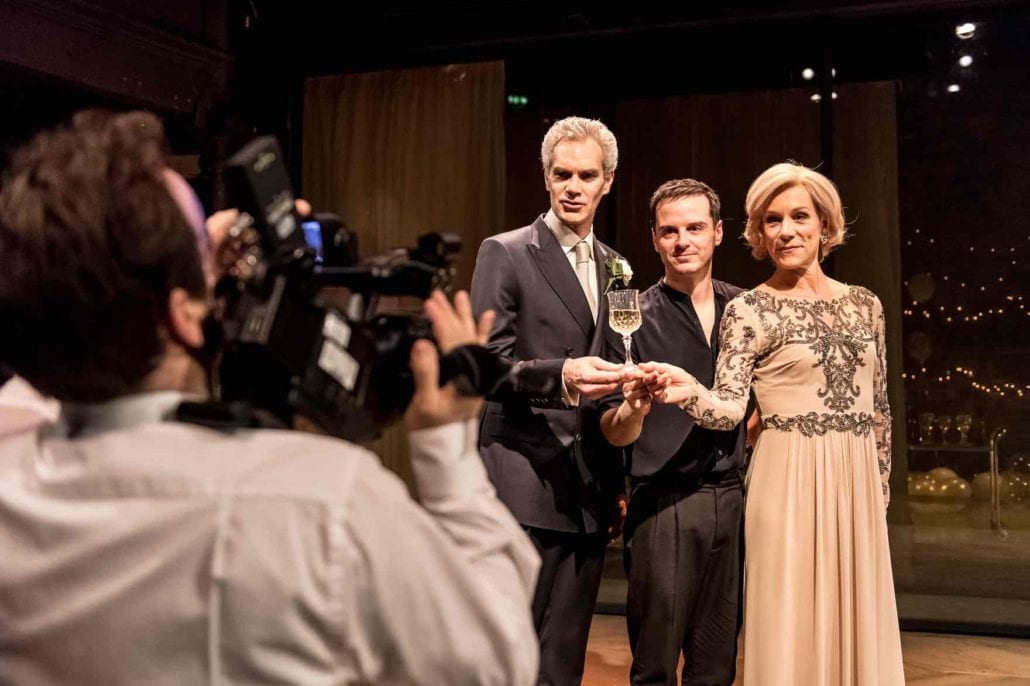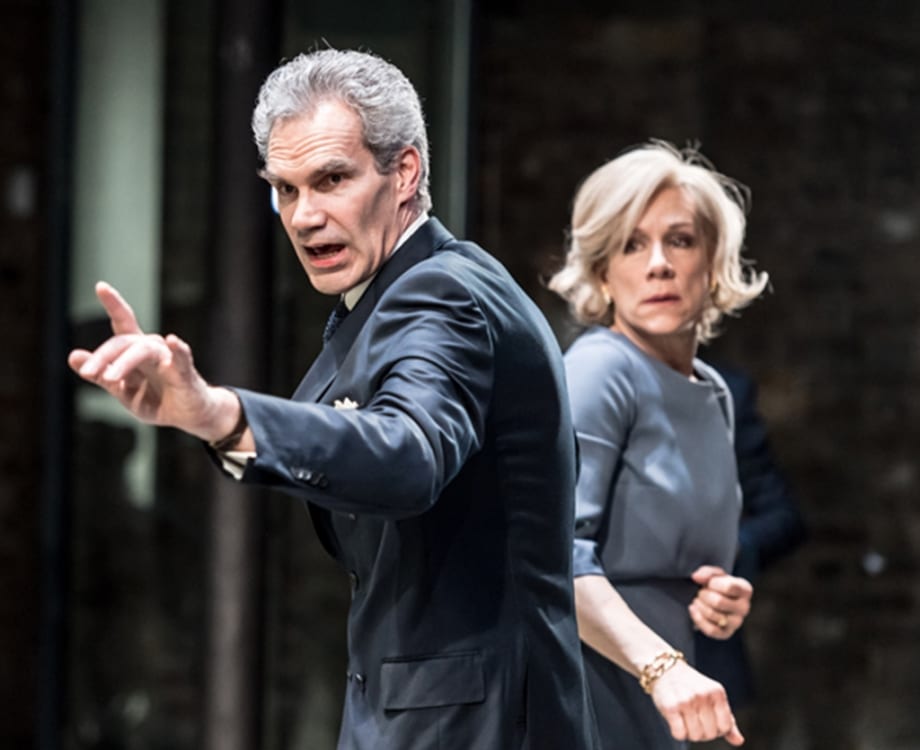Robert Icke’s Hamlet at Almeida Theatre is a resounding success. This is not because of the media hype associated with Andrew Scott’s turn as Moriarty in the now cult TV version of Sherlock Holmes. Scott as Hamlet, under direction of one of the most promising British theatre directors, becomes a truly tragic figure, but remains an everyman, one of us: a person utterly crushed by bereavement and betrayal.
His sadness and loss affect us even stronger in the intimate space of Almeida. The stage is divided by sliding glass doors into two rooms and a corridor. The front of the stage is the first plan where crucial events take place: revealing of the Ghost at the security guards’ CCTV room, the Mousetrap, the closet scene, Ophelia’s funeral, the final duel and deaths of Hamlet and his family. The spaces behind the glass wall show us glimpses into lives of most characters. They are brief dumb shows, where we see them intimate with each other: the wedding reception with Gertrude and Claudius dancing in a loving embrace, Ophelia in a bath tub startled by Hamlet’s sudden visit, and all dead characters’ ghosts uneasy gathering in the finale.
Scott, all in black, cuts a quiet, demure figure from the first moment on the stage: he sits hunched back, not engaging with anyone and when he starts to speak he is not raging or defiant. He speaks softly and slowly with characteristic Irish lilt. It is clear he is not a man for the job, namely avenging his father’s death. We know he is going to fail and this makes the tragedy of Hamlet much more profound and heart-breaking.
Scott’s characterisation of Hamlet, not as a man of action but as a man of inaction and impending failure is well-matched by his verse speaking: some cadences are broken, even inaudible. Yet the words that matter to him are pronounced deliberately and thus sink in better than if the same emphasis was given throughout each long speech. His body language further augments the often juxtaposed moments of clarity and confusion: he smiles and maintains eye contact with spectators, getting as close as possible to the audience in the stalls; or he looks sideways without engagement, painfully scratching his forearms in palpable desperation.
Is Hamlet really mad – is the conundrum one always tries to find an answer to when watching each staging of Shakespeare’s play. In Icke’s version he is mad, there is no question about it. He might have faked it to begin with but he is a man deeply depressed from the start and gives in to madness freely, recovering only towards the end and just for a brief moment when he accepts he is not going to survive Laertes’ challenge. Thus the political underpinning of the play is barely to be seen – the rolling news coverage (in Danish!) of Fortinbras’ progress in Poland and his invasion of Denmark is just a token element in much weakened discourse of power.
Unusual characterisation is also offered by Angus Wright as Claudius and Juliet Stevenson as Gertrude. Instead of a scheming or cruel king and deceived or lusting queen we see an age appropriate couple, much in love, who are more interested in spending time together than being involved in politics. Claudius’ first address to Hamlet after his wedding is measured, logical, understanding – not a trace of menace or cunning to be detected. Gertrude is happy and her son’s attack in her bedchamber comes as a shock. She would need more proof than Hamlet’s mad assertions accompanied by a gun pointed at her head. When she finally realises the extent of Claudius’ machinations she will however stand up for herself and her son.
In this production only more traditional portrayals of Shakespeare’s characters somehow fail to engage. Jessica Brown Findlay’s Ophelia speaks her lines too quickly and is just daddy’s mild-mannered daughter. She finally owns her part as mad Ophelia but it is a bit too little too late to create a memorable performance. There is also a textbook Polonius and Laertes. Perhaps most disappointing is Hamlet’s friend Horatio: he is a good listener but this translates as boring on the stage in the production which is already a slow-burner.
Indeed the pace of the show is deliberate (occasionally too much as in the gravedigger’s scene for example) with lots of silence and pauses. This was a risky decision since Icke’s Hamlet takes four hours and two intervals to reach its final conclusion. But it is perfectly matched by music used in the production, most notably Bob Dylan’s ballads which create the right mood inviting the audience to ponder and let go. At the same time Scott unravels Hamlet’s character for us with empathy and purpose, giving spectators enough time to understand his plight: indeed he is a story-teller extraordinaire and Icke gives him ample time to prove it.
Icke’s production is surprising in its respect for Shakespeare’s text and single-minded crusade to make it heard now and mean something to everyone. Yet he gives us a production that is not old-fashioned or traditional. I recommend that you see Hamlet at Almeida which in my view remains, so far, the most poignant, important production this year and is not to be missed.




